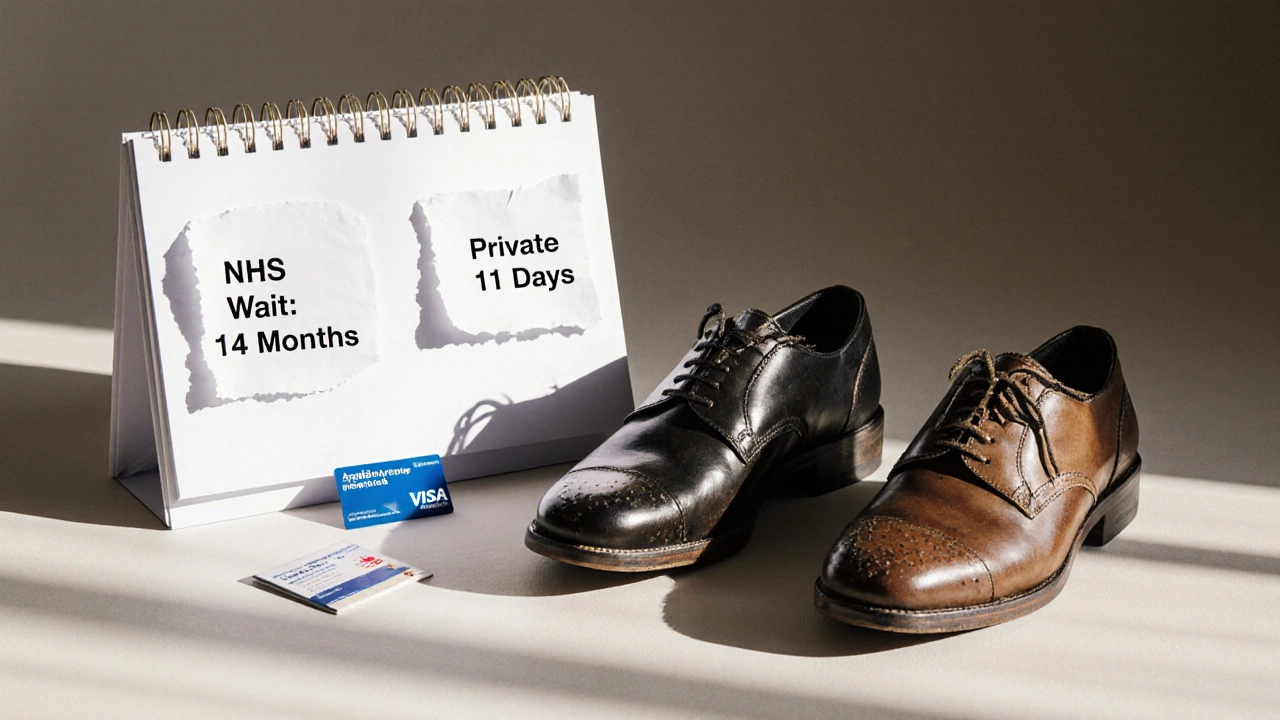Let’s be honest - if you’ve ever waited weeks for an NHS appointment, only to be told you’ll need to wait another six months for surgery, you’ve probably wondered: is it worth having private health insurance in the UK? It’s not just about luxury. For many, it’s about control - control over when you’re seen, who treats you, and how much time you lose to bureaucracy.
What private health insurance actually covers in the UK
Private health insurance in the UK doesn’t replace the NHS. It sits alongside it. Most policies cover acute, short-term conditions that need quick diagnosis and treatment - things like hernias, cataracts, knee replacements, or even certain types of cancer care. They don’t cover long-term conditions like diabetes or chronic back pain, and they won’t pay for emergency care - that’s still the NHS’s job.
Typical plans include access to private hospitals, choice of consultant, and faster scans. You might get an MRI in 48 hours instead of 12 weeks. You might see a specialist within days, not months. Some insurers even offer virtual GP consultations, mental health support, and physiotherapy as add-ons. But read the fine print: not all hospitals are covered, and some treatments require pre-approval.
How much does it cost?
In 2025, a basic private health insurance plan for a 35-year-old non-smoker starts at around £600 a year. That’s roughly £50 a month. For a 50-year-old, it jumps to £1,200-£1,800 annually. Family plans? Expect £2,500-£4,000. Premiums rise with age, location, and medical history. Smoking adds 20-40% to your bill.
Compare that to the NHS: free at the point of use. But here’s the catch - free doesn’t mean fast. A hip replacement on the NHS can take 18-26 weeks from referral to surgery. Private? Often under 4 weeks. If your job depends on being mobile, or you’re tired of watching your quality of life slip away while you wait, that time has value.
When private insurance makes sense
It’s not for everyone. But here are three real situations where it pays off:
- You’re a working professional with a high-stress job. A minor injury or sudden pain can mean lost income. Getting treated quickly means getting back to work faster.
- You’ve had a bad experience with NHS delays. Maybe you waited 9 months for a specialist referral, only to find out the issue was treatable - if you’d acted sooner.
- You’re planning for future health. If you’re in your 40s or 50s, locking in a policy now means lower premiums and no exclusions for pre-existing conditions later.
One client I know - a teacher in Manchester - had chronic knee pain. NHS waiting list: 14 months. Private insurance: 11 days from GP referral to surgery. She was back in the classroom before the term ended. Her insurance cost £720 a year. Her lost wages during the NHS wait? Over £4,000.

When it doesn’t make sense
Private insurance isn’t a magic fix. If you’re under 30, healthy, and rarely need medical care, you’re probably better off saving that £50 a month. The NHS does a solid job with emergencies, maternity care, and long-term conditions. You don’t need private insurance to get a broken arm treated or a baby delivered.
Also, if you have a pre-existing condition - say, asthma, depression, or a past heart issue - insurers might exclude it from coverage or charge extra. Some won’t cover it at all. You can’t buy insurance after you get sick and expect it to help. That’s not how it works.
The NHS isn’t broken - it’s just overloaded
Let’s not pretend the NHS is perfect. But it’s still one of the most efficient public health systems in the world. It treats millions annually, saves lives, and doesn’t turn people away because they can’t pay. Private insurance doesn’t fix the NHS. It just gives you an alternative route.
Many people use both. They rely on the NHS for routine care and emergencies, and turn to private insurance when they need speed. It’s not an either/or choice. It’s a layered system.
What you’re really paying for
Private health insurance isn’t just about medical care. It’s about peace of mind. It’s about not having to Google symptoms at 2 a.m. wondering if you’re wasting time waiting for an appointment. It’s about choosing your surgeon, not being assigned one. It’s about having a private room instead of a ward with 6 others.
For some, that’s worth £50 a month. For others, it’s a luxury they can’t justify. The real question isn’t whether private insurance is expensive. It’s whether your time, comfort, and mental health are worth more than the cost of a monthly subscription.

Alternatives to private insurance
You don’t have to go full private to get faster care. Here are three practical alternatives:
- Private GP services: Pay £50-£80 for a same-day appointment. Get a referral to a private specialist without waiting for an NHS slot. You pay upfront, but you skip the queue.
- Health cash plans: These aren’t insurance. They’re savings plans. Pay £10-£20/month, and get cash back for dental check-ups, physio, or optical care. Good for routine needs.
- Self-pay options: Many private hospitals offer fixed-price packages for common procedures - £3,000 for a knee arthroscopy, £5,500 for a hernia repair. No insurance needed. You pay directly, but you know the cost upfront.
One woman in Bristol paid £4,200 out-of-pocket for a hip replacement through a fixed-price deal. She got the surgery in 3 weeks. Her NHS wait would’ve been 18 months. She didn’t have insurance. She just did the math and paid directly.
How to choose a plan
If you’re considering insurance, here’s what to look for:
- Network of hospitals: Make sure your preferred hospitals are covered. Check if they include private wings in major NHS hospitals.
- Exclusions: Read the small print. Mental health? Physio? Alternative therapies? Some plans limit these.
- Waiting periods: Some policies have 6-12 month waits for back or joint treatments.
- Renewal terms: Does the premium jump every year? Can they cancel your policy if you get sick?
- Extras: Do they include telehealth, second opinions, or wellness programs?
Don’t just go for the cheapest. A £400 plan might exclude everything you need. A £1,000 plan with broad coverage could save you thousands in lost time and stress.
Final verdict: Is it worth it?
Yes - if you value time, choice, and certainty. No - if you’re young, healthy, and don’t mind waiting.
Private health insurance in the UK isn’t about being rich. It’s about making a calculated trade-off: pay a little now, or wait a long time later. For many, that trade-off is worth it.
The NHS is there for everyone. Private insurance gives you a lane to move faster. It’s not a right. It’s a choice. And like any choice, it only makes sense if it fits your life - not someone else’s.
Can I get private health insurance if I have a pre-existing condition?
Yes, but it’s complicated. Most insurers will exclude the specific condition from coverage. For example, if you’ve had diabetes for 5 years, your policy won’t cover diabetes-related care - but it might still cover a broken leg or a hernia. Some providers offer limited coverage after a waiting period, but premiums will be higher. Never assume you’re covered - always ask for written confirmation of exclusions.
Does private health insurance cover mental health?
Some do, but not all. Basic plans often exclude mental health. Mid-tier and premium plans usually include access to therapists, counselling, and sometimes inpatient psychiatric care. Look for policies that specify ‘psychological therapy’ or ‘mental health support’ in the benefits. Many insurers now offer 6-12 free therapy sessions per year as part of wellness packages.
Can I use private insurance for dental or eye care?
Not usually. Private health insurance covers medical treatment, not routine dental or optical care. For teeth and eyes, you need separate dental insurance or a health cash plan. Some insurers offer these as add-ons, but they’re not part of standard medical policies. If you want coverage for fillings, crowns, or glasses, look at cash plans or standalone dental insurance.
What happens if I cancel my private health insurance?
You go back to the NHS queue. That’s it. But here’s the catch: if you cancel and later want to rejoin, insurers may treat any new condition as pre-existing - even if you were healthy when you cancelled. For example, if you develop back pain after cancelling, your new policy might exclude back treatments. Rejoining later often means higher premiums and new waiting periods.
Is private health insurance tax-deductible in the UK?
No. Private health insurance premiums are not tax-deductible for individuals. However, if your employer pays for your private health insurance as a benefit, it’s considered a taxable benefit in kind. You’ll pay income tax on its value. Some companies offer it as part of a benefits package, but you won’t get a tax break for paying for it yourself.
Can I get private treatment without insurance?
Absolutely. Many private hospitals offer fixed-price packages for common procedures - from hernia repairs to cataract surgery. You pay upfront, but you avoid insurance paperwork and get fast access. Prices are often transparent and can be cheaper than you expect. For example, a private knee arthroscopy might cost £3,500. Compare that to waiting 18 months on the NHS - and you might find paying directly is the smarter move.





